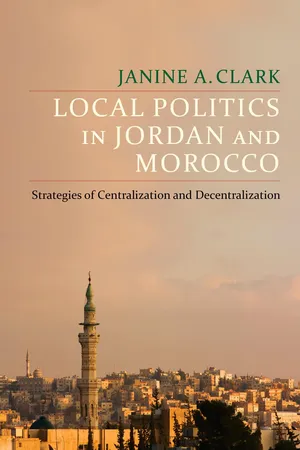
Local Politics in Jordan and Morocco
Strategies of Centralization and Decentralization
Janine A. Clark
- English
- ePUB (mobile friendly)
- Available on iOS & Android
Local Politics in Jordan and Morocco
Strategies of Centralization and Decentralization
Janine A. Clark
About This Book
In recent years, authoritarian states in the Middle East and North Africa have faced increasing international pressure to decentralize political power. Decentralization is presented as a panacea that will foster good governance and civil society, helping citizens procure basic services and fight corruption. Two of these states, Jordan and Morocco, are monarchies with elected parliaments and recent experiences of liberalization. Morocco began devolving certain responsibilities to municipal councils decades ago, while Jordan has consistently followed a path of greater centralization. Their experiences test such assumptions about the benefits of localism.
Janine A. Clark examines why Morocco decentralized while Jordan did not and evaluates the impact of their divergent paths, ultimately explaining how authoritarian regimes can use decentralization reforms to consolidate power. Local Politics in Jordan and Morocco argues that decentralization is a tactic authoritarian regimes employ based on their coalition strategies to expand their base of support and strengthen patron-client ties. Clark analyzes the opportunities that decentralization presents to local actors to pursue their interests and lays out how municipal-level figures find ways to use reforms to their advantage. In Morocco, decentralization has resulted not in greater political inclusivity or improved services, but rather in the entrenchment of pro-regime elites in power. The main Islamist political party has also taken advantage of these reforms. In Jordan, decentralization would undermine the networks that benefit elites and their supporters. Based on extensive fieldwork, Local Politics in Jordan and Morocco is an important contribution to Middle East studies and political science that challenges our understanding of authoritarian regimes' survival strategies and resilience.